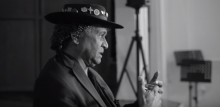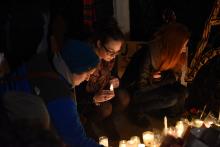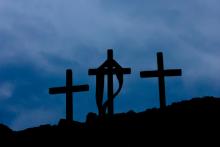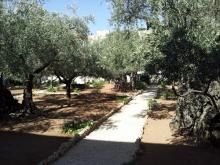holy week

I drove by a church last week, a few days before Palm Sunday, and read their sign: CHRIST HAS RISEN!
Um, no. No he hasn’t. In the Christian calendar he hasn’t even died yet. But this is an all-too-common phenomenon in Christian Churches.
Why?

Pastor Ray says that the Good Samaritan story leads Christians to ask, Where is the church in the healing of these wounds?
“The healing of our wounds becomes the healing of your wounds as well,” he says.

With Australia’s Harmony Day falling during Holy Week this year, this is a timely opportunity to meditate upon Jesus’ call to love thy neighbor and ask, “What is the connection between loving God and neighbor?” And, “Can you have one without the other?”
On this first day of our campaign, Louisa Hope — taken hostage and shot in Sydney’s Lindt Café siege, that made international news just over one year ago — tells her story. It’s a challenging testimony of how Jesus’ love, seen in his death on the cross, can overflow into love of others.


All Holy Week, I've been listening to Hozier's “Take Me to Church” — an odd sort of spiritual exercise, I suppose.
At first it was the hauntingly catchy refrain: “Take Me to Church” — and after all I would be going to church all week this week, the holiest of weeks in the Christian calendar. Maundy, or Holy, Thursday, Good Friday, Easter Vigil, Easter Sunday.
The refrain was jarring against the artist's desired impact of the song, that in fact no one would be taken to church, that no one would trust the institutional church that has proven so dogmatic, divisive, violent, and decidedly un-Christlike in its practice as to become "a fresh poison each week."
“Take Me to Church” is about sexuality, about dogma, about prayer, about worship, about heaven, hell, life, death, sacrifice, sin, confession, and absolution. It’s about Catholicism and Protestantism and Jesus and atheism and fear and hope and love.
We each see pieces of it. Many American viewers saw Hozier's music video and wrongly assumed he was gay — that the sum of his message was about the church's persecution of homosexuality. And even though Hozier is not gay, he did mean to indict the church for its horrible treatment of the LGBTQ community — but the message of his song goes beyond sexuality.
Hozier is an Irish singer, a man who grew up with the deadly legacy of Catholic-Protestant war, a man whose national church was beset by sexual abuse scandals and pews full of dogmatic believers who had never read the Bible. Masses in many cases were dominated by ritual and women and babies sent away to church-run facilities, like the one where the bodies of nearly 800 infants were recently found in an unmarked mass grave.
Americans can look on the Irish church with judgment, yet our own church scandals and hypocrisy can fill even more pages.
As a pastor looking toward Easter Sunday 2015, I see something else in these lyrics. I see and hear a deep longing. Not only for sex. But a longing for the God who came to earth in Jesus, who died and rose again because of love.
I asked colleagues and friends about their responses to this song, as it dominates airwaves during Holy Week, and no one seemed to want to broach the topic. Too sexual, some said. Another, that "it could not be redeemed." Another, that "people would be too offended."
1. At Least 10 Religious Groups Have Come Out Against Anti-LGBT 'Religious Liberty' Laws
"While substantial attention has been paid to the lawmakers, athletes, businesses, and celebrities who have challenged the new laws, less has been said about the steady flow of criticism from the exact group these RFRAs are ostensibly designed to protect: people of faith."
2. Stress and Hope in Tehran
On Thursday, the U.S. and Iran along with five world powers reached a preliminary deal that would curb Iran’s nuclear program and address sanctions imposed upon the country. The New York Times offers this glimpse into what those sanctions mean for ordinary Iranians.
3. Outcry Over RFRA Might Be a Fear of Christians
"The outcry isn’t about the law, it’s about us. It’s a fear that we will discriminate. And it is a fear based on a history that, whether we like it or not, is ours. We have, in no shortage of ways, broken relationships with the LGBTQ community. We have expelled our sons and daughters. We have protested them. We blamed them for the ills of society like a scapegoat. And no matter what we believe about same-sex marriage, that is wrong. Because of that, restoring relationship and trust with the LGBTQ community is on us."
4. Why I Won't Wear White on My Wedding Day
"As far as we have come, and as removed from these traditions’ origins as we may be, we are still attached to these remnants of a woman’s worth and identity being grounded in her sexual activity, importantly solely for the purposes of her pleasing a man."

We call it Holy Week. But it was a terrible week.
His trial reeked of injustice. His own disciple sold him out for a few pieces of silver, betrayed him with a kiss … and hung himself.
As he was arrested, one of his closest friends disregarded all his teaching on love, pulled out a knife, and cut a guy’s ear off. (Jesus called him out … and healed the other guy). A lot of the stuff that happened that first holy week was pretty unholy.
Once arrested, he was passed back and forth between politicians and bureaucrats. There was Caiaphas the priest, the Sanhedrin council, Pontius Pilate, the crowd — everyone seemed to want him dead, but no one wanted blood on their hands. Even Pilate washed his clean.
They had all kinds of accusations. Insurrection. Inciting a riot. Conspiracy. Terrorism (plotting to destroy the temple). Blasphemy.
But all he did was love. And heal. And give people hope.
Despite any substantial evidence, witnesses, or signs of any crime committed, he was pronounced guilty and sentenced to die.
As he awaited his fate, he was bullied, interrogated, harassed, tortured, beaten to a pulp. The authorities humiliated him and stripped him naked. They mocked the claims of his divinity, ramming a crown of thorns onto his head and wrapping him in a royal purple robe as they laughed.
And so it went. This man who many believe was the holy one that the prophets spoke of, the long-awaited Messiah, God incarnate, love with skin on— was executed, brutally. He died with his body convulsing as his lungs collapsed, with vultures swarming overhead, hoping to clean up after the execution. There is nothing more evil than what happened that “Good” Friday.



Among Christians who practice Lent, the Holy Week timeline is a time for reflection on the practices of Jesus in his last days prior to his death. Reflecting on Holy Week can be a spiritual practice to consider the place of those practices in our own lives. According to the Gospel of Mark, Jesus followed his triumphal entry into Jerusalem on Palm Sunday by taking time on Monday during that week to publically drive out and speak against temple-based financial exploitation.
The cleansing of the Temple is documented in all four gospels. Three place it during Holy Week. Scholars have written that this event occurred in the area of the Temple known as “Solomon’s Porch,” which was open to Jewish and Gentile worshippers alike. It was a marketplace for the purchase of items needed for worship — pilgrims attending Passover celebration, unfamiliar with Jerusalem, may have purchased sacrificial animals at a higher price than elsewhere in the city. Poorer individuals, unable to afford a lamb, may have purchased overpriced sacrificial doves. Foreign currency, forbidden inside the Temple, could be exchanged, for a fee, for local currency to pay the annual Temple tax.
It has been argued that the High Priest may have received a percentage of the profit from the money changers and merchants, so their removal from the Temple would have caused a financial loss to those in power. It has been argued that the noisy marketplace atmosphere may have been disruptive to the atmosphere of worship. The text is unclear about the exact nature of the sin. However, it is clear that when Jesus saw the market, he became angry and turned over tables, driving out those exploiting the people and publicly calling them “robbers.”
Whatever the exact nature of the financial sin was that was occurring in the Temple at the time, the text in Mark suggests that after this act of clearing the Temple, those in power began to earnestly plot Jesus’ arrest and death. Jesus’ opposition to the money changers was directly related to his arrest and crucifixion later in the same week.
While I would like to identify with Jesus in this story, I realize I am more often in the position of the watching crowd. Or am I the merchant, lining my own pockets with the misfortune of others and making profits or receiving benefits from practices that exploit?


I used to hate Good Friday. Jesus dying a gruesome and unjust death didn’t seem particularly “good” to me. Even now, when I watch a Jesus movie like The Greatest Story Ever Told (or let’s be real: Jesus Christ Superstar), I find myself secretly hoping that someone in the crowd will say “wait a second! Just four days ago we really liked this guy. Crucifixion is a terrible idea, let’s go have Passover.” Mic drop.
The idealist and optimist in me would prefer to be reminded that the cross was empty, that Jesus was alive, to focus less on Good Friday and more on Easter Sunday. But I have come to appreciate the image of Christ on the cross much more now that I’m an adult and there are things that I have said and done in my life that deserve a reckoning. Jesus is there, gladly bearing my sin on the cross.
I’ve come to appreciate that there are so many broken and twisted places in this world that need a Redeemer. And Jesus is there, undoing the power of sin and evil on the cross.
 Editor's Note: Sojourners is celebrating Earth Week with a special message series every day next week. Click here to join us!
Editor's Note: Sojourners is celebrating Earth Week with a special message series every day next week. Click here to join us!
“Behold, I am making all things new!” says Jesus in the book of Revelation. It’s this spirit of hope and second chances that we celebrate at Easter time. Life triumphs over death and decay. We get a second chance.
But what about our planet? A cursory glance shows us that God’s creation could use some renewal.
Creation is definitely groaning. We’re losing species, spilling oil, and changing our climate at an alarming rate. We’re building sea walls and responding to pumped-up natural disasters. Energy companies are pushing for even more access to the fossil fuels that are harming God’s creation. Action from Congress seems far away, and moneyed special interests are working hard to block other kinds of action.

Friedrich Nietzsche is a favorite whipping boy among Christians. It’s difficult to blame my fellow Christians for this. After all, Nietzsche is known for many provocative anti-Christian statements, but his most provocative statement might be that “God is dead.”
And yet, in his latest book A God Torn to Pieces: The Nietzsche Case , philosopher Guiseppe Fornari makes a claim that is just as provocative: “In the end [Nietzsche] was much closer to Christ than many who would claim to be Christians.”
Wait …Nietzsche was closer to Christ than many Christians? How could that be?
Nietzsche understood the implications of what Christ did on Good Friday better than many who claim to be Christians. Nietzsche was closer to Christ than many Christians because he knew the Christ that he rejected, whereas many Christians don’t know the Christ whom they call Lord and Savior.
Who was the Christ that Nietzsche rejected and that many Christians do not know? It’s the Christ who says from the cross, “Father, forgive them, for they know not what they do.”

The Cross is an inexhaustible mystery, but among the many things it does so well is make visible the love of God.
In Jesus Christ, God is not an abstraction, concept, or idea. The Unknowable is made known. The Invisible is made material. All mysticism is now grounded, and all agnosticism now countered, in this particular Person; there is now, paradoxically, a Measure within Measurelessness.
"For in Christ lives all the fullness of God in a human body." (Col. 2:9) "For God in all his fullness was pleased to live in Christ." (Col. 1:19)
Conversely, whatever is not revealed in Jesus is not the Triune God.
Contemporary Christians (of all sorts of persuasions) tend to de-couple God from Jesus.

We love a good parade, don’t we? All that celebration, the noise, the crowds, the jubilation … It’s exciting and contagious and a little amazing how a good parade can impact us.
No one understood this like the Romans. These are the people of bread and circuses after all, and no one in the ancient world did empire better than the Romans. The Romans were incredibly good at subduing those people they had conquered. They celebrated the festivals of, raised up leadership from, and generally ingratiated themselves smoothly into the lives of those they ruled. But rule they did.
There certainly were people in Jesus’ time who thought Jesus’ work would be to overthrow the Roman oppressors — establish a political kingdom. Scholars surmise that Judas, the disciple who would betray Jesus to the empire, was one of these. Think of Judas as someone who saw the evils of the Roman Empire and desperately wanted Hebrew rule returned to the region. What we might today call a freedom fighter.
But throughout his ministry, Jesus talked explicitly about the Kingdom of God, the Kingdom of Heaven that is not of this world but is omnipresent, always at hand, constantly among us. And God’s. Period. A very different image of kingship, of dominion.

In the Garden of Gethsemane, Jesus utters his agonizing prayer, “Abba, Father, for you all things are possible; remove this cup from me; yet, not what I want, but what you want.”
Who among us hasn’t found ourselves in a situation where the inevitable seems impossible? Where the unavoidable seems unimaginable?
Who hasn’t said to God, in so many words, “Remove this cup”?
The most difficult thing in such a situation may be its crushing inevitability. You want to escape from your life, which suddenly feels like an oncoming train about to run you down. It is the shock you feel when you receive a frightening diagnosis from your physician. When you are laid off from a job. When a friend dies. When a relationship ends. You say to yourself, “This cannot be happening.”

As we approach Holy Week, I’ve been re-reading the Gospel accounts of Jesus’ Last Supper, trial, crucifixion, and resurrection. In John 17, as Jesus prays for his disciples and their successors in the hours before he is arrested, he prays for our unity as his church:
…that all of them may be one, Father, just as you are in me and I am in you… May they be brought to complete unity to let the world know that you sent me and have loved them even as you have loved me. (John 17:21, 23)
Central to our mission as Christ’s followers is to share with the world this good news: that the Father sent the Son because he so loved the world — but the best observable evidence of that Gospel reality, a unified Church, seems a distant, utopian dream. Just within the United States — this small sliver of the global church — we are divided by denomination, by race, by political ideology, and by the competitive human instinct that leads even those congregations who resemble one another doctrinally, ethnically, and politically to jockey over the same individuals in order to fill their sanctuaries (or auditoriums) and offering plates. Perhaps the situation is not quite so stark: I know that many — probably most — believers share the desire for unity. It just seems at times that we have so far to go, and might be drifting in the wrong direction.

This Wednesday marks the beginning of Lent with Ash Wednesday. For Christians, Lent is a 40-day season of fasting, reflection, and penance culminating in Holy Week and the Easter Sunday commemoration of Jesus’ Resurrection.
The Rev. Arne Panula, director of the Catholic Information Center in Washington, D.C., said his experience is that more people go to church on Ash Wednesday than any other holiday, including Christmas and Easter.
Here are a few basics on the Ash Wednesday tradition.

As Christians around the world gathered for Good Friday and Resurrection Sunday celebrations last weekend, I have reflected a great deal about the connection between the suffering and passion of Christ and the plight of the undocumented in our nation.
This past year, an amazing surge of activity and concern has emerged among believers in general, and evangelicals in particular focused on passing a new immigration policy in our country. This development is quite a surprise and change. In fact, 10 years ago it was almost impossible to find a recognized evangelical leader who was knowledgeable about immigration, let alone one who was willing to speak out on this issue.
At the core of why evangelicals have made such a dramatic change of heart is the reading of Scripture. While it is impossible to ignore that there are 92 references in Scripture where the word, 'ger' is used, speaking about the stranger in our land and our treatment of these individuals, it is not one single verse but the entire revelation of Scripture that points us towards our responsibility to love the most vulnerable people in our society.